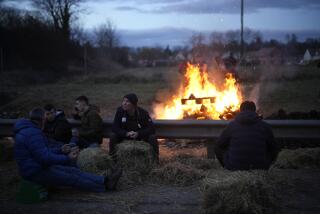West German Youngsters Spurn Farming to Cash In on Nation’s Booming Economy
- Share via
AURINGEN, West Germany — How do you keep the kids down on the farm after they’ve seen the big bucks and high life? In West Germany, as in many other places, you usually don’t.
This is Europe’s richest country, and its living standard is among the highest in the world. The family farm has a tough time holding its own in such an atmosphere.
When West Germany was born in 1949 it had 1,646,751 farms, but that has changed dramatically.
“By the end of 1987 there were only 382,800 farms still operating full time, with another 280,200 part-time farmers who held other jobs,” said Peter Neuling, an Agriculture Ministry statistician.
West Germany is heavily industrialized and densely populated, with nearly 62 million people living in an area about the size of Oregon. The average farm is just under 70 acres and a part-time farmer generally works less than 15 acres, Neuling said in a telephone interview.
Farms are closing because industry is flourishing, Neuling said, and that “is a sign our economy is strong.” But Alfred Kunze, 64, and other farmers say the trend is killing a tradition important to national self-sufficiency.
“We’re not going to have anyone following in our footsteps; there won’t be any experienced young to take over,” Kunze said at his home in Auringen, about 35 miles west of Frankfurt.
He acknowledged that farming had become risky because of overproduction throughout Europe. Kunze said his 36-year-old son, Hubert, “wanted to be a farmer but I told him to study another business just in case.”
Hubert Kunze now is a computer specialist and normally works an eight-hour day. His father observed wryly: “Farmers can’t count on eight-hour days.”
As a member of the European Economic Community, West Germany must import farm products from other members to help balance the industrial goods it exports to them.
That shrinks markets and prices for West German farmers, said Alfred Kunze, who runs a 3,500-tree fruit farm in central Hesse state.
Taxes to support health, retirement, unemployment and other social benefits also make farming more difficult here than in other West European nations where labor and overhead are cheaper.
As costs rose, West German farmers tried to close the gap with increased crop yields and animal feed containing hormones, Kunze said.
He said use of new fertilizers had doubled grain production since World War II and cited the example of wheat, which went from an average of about 30 bushels an acre to more than 50.
“To speed up the growth of calves raised to produce light-colored meat for veal, which the customers demand, the animals were fed milk-base products spiked with hormones,” Kunze said.
Now, however, environmentalists complain that chemical fertilizers pollute waterways and regulations forbid the use of hormones in animal feed.
In an attempt to cut production, the government is paying farmers about $250 an acre to take land out of cultivation. More than 25,000 farmers have submitted applications let roughly 425,000 acres lie fallow in the 1988-1989 growing season.
“This is going to turn German farmland into fruitless plains,” said Klara Schecke, 60, whose family operates a dairy farm with 70 head of cattle near Bad Orb, 25 miles east of Frankfurt.
Hiring help is difficult, even though 8.1% of West Germans were unemployed at the end of November. Schecke said it was almost impossible to find a young person willing to learn farming as an apprentice.
An advertisement in Hessebauer, the Hesse state weekly farm magazine, accomplished nothing, she said.
“In the latest edition there were 12 advertisements seeking apprentices, Schecke told an interviewer. “We checked, there hasn’t been a single response. The young see absolutely no future in farming anymore.”
More to Read
Sign up for Essential California
The most important California stories and recommendations in your inbox every morning.
You may occasionally receive promotional content from the Los Angeles Times.












